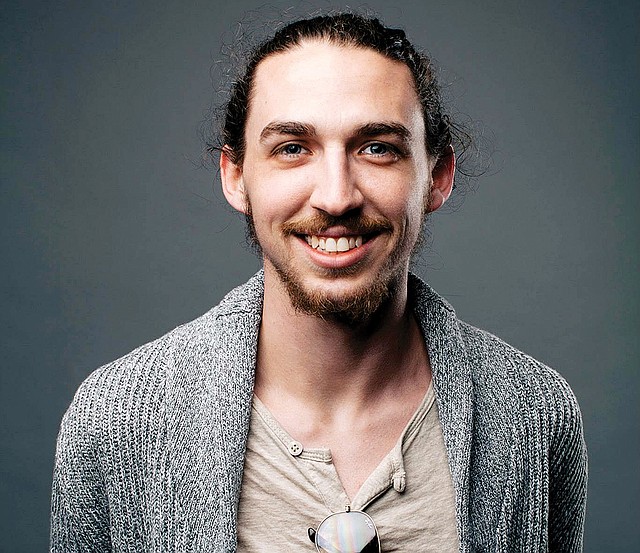Telling his story
Arkansas native Seth Savoy takes filmmaking skills to Chicago and beyond
As of Monday, March 21, 2022
At 23, some are still trying to figure out what to do in life. It’s an age where many people feel lost and don’t know where to go next.
For film and music video director Seth Savoy, 23, it’s that struggle and its consequences that inspired the script for his first feature-length film. Savoy’s most visible work has been in the realm of music videos and short films. As an artist, he’s selective about his work and has established himself with a good enough reputation that musicians seek him out.
Most recently, Savoy has shot videos for the songs “Profit” by Little Rock rapper Nick Ward and “First Cut” for Chicago-based rock band Open Your Eyes.
But music videos aren’t his primary focus. Now, he’s focused on taking the next step in becoming a feature filmmaker with a budget big enough to achieve his vision.
Q: Where are you from?
A: I grew up in Maumelle and went to Catholic High School for Boys, which I think is a huge reason I have the work ethic that I do.
Q: How did you wind up going from Arkansas to Chicago?
A: I went to [the University of Central Arkansas] for two years and wound up transferring. I had never really left Arkansas. Columbia College in Chicago called me and said they’d give me a big scholarship. I woke up the next day, packed my things in a U-Haul and headed to Chicago.
Q: How’d you catch the school’s attention?
A: I started off with music videos in Little Rock. I shot everyone that came to town. I did short films at the same time. Columbia saw my music videos, and they gave me 80 percent of a full ride.
I graduated film school in 2014 and stayed in Chicago.
Q: What is your goal as a filmmaker?
A: My goal as a filmmaker is to make someone feel and think.
Q: What sort of films do you like?
A: I like indie dramas. I think they make people think about what they perceive and tolerate. You can change people’s minds. Drama goes into political commentary. So they work hand in hand.
Q: Did you have a mentor?
A: My mentor is John D. Hancock. Blood Brothers, a movie I shot half in Arkansas and half in Chicago … he saw it and said he wanted to be my mentor.
Q: Is Blood Brothers a short film?
A: Blood Brothers got a pretty good reaction. I made a 30-minute piece, but I wanted to show I had the ability to go longer. A 30-minute film can show what you can do with more time.
Q: What’s next for you?
A: It’s a big-budget studio picture that will film next summer in Chicago. It will be released in 2017.
Q: What is the movie about?
A: It’s a Chicago-based story. Sort of like a political commentary. It’s about four kids in Chicago who got college degrees from a prestigious school and still can’t get a job. So they rent U-Hauls and rob houses. It’s called Echo Boomers. Echo boomers are the people born between 1980 and 2000 who have degrees but can’t get a job.
Q: How did you get a feature film?
A: This past year, I took time to write the Echo Boomers. I pitched it at the Sundance Film Festival and won.
Q: What’s the budget like?
A: The budget is $2 million.
Q: What sort of camera do you use?
A: The Red Dragon shoots 6K. It can do slow motion. … It does it all. If you wanted to just buy the camera, it’s $50,000. It’s the industry standard. It has been used to film movies like The Hobbit.
Q: What do you use to edit films?
A: I edit with Adobe Premiere. It’s the only type of software that keeps up with the camera I use. I used to use Final Cut with the DSLR. But they couldn’t keep up with the resolution of the Red Dragon.
Q: How big of a crew do you usually work with?
A: It depends. In Chicago, the crew ranges from seven to 50, depending on what we’re shooting.
In Arkansas, I had about 12 crew members. Since I went to UCA, I could come back, and I can ask [people I know in Arkansas], “Do you want to help me out?” Some of those people had films screening at the Little Rock Film Festival, and they chose to help me instead. They’re always ready to make the next great one.
Q: How long does it usually take to film a music video?
A: It depends. It all comes down to concepts. Normally, turnaround time is the same for each.
Q: What is your process when it comes to music videos?
A: I listen to the songs and picture it in my head. I’m pretty selective with what I do. People come to you, and you get good stuff and bad stuff.
Q: Is YouTube essential for music videos?
A: For music videos, YouTube and blogs are the place to be. Really, for everyone from Taylor Swift to the smallest band in the world, YouTube is the place to be.
Q: Is YouTube also a venue for indie films?
A: I’d say there are other mediums. IndieFlix is all indie films. I don’t throw stuff on YouTube to get views. I go to festivals and selective markets. I don’t want my product to feel like they should be on YouTube. I want them to feel like they should be in a theater.
CORRECTION: The budget for Seth Savoy’s film Echo Boomers was $2 million. An earlier version of the story had an incorrect amount.
